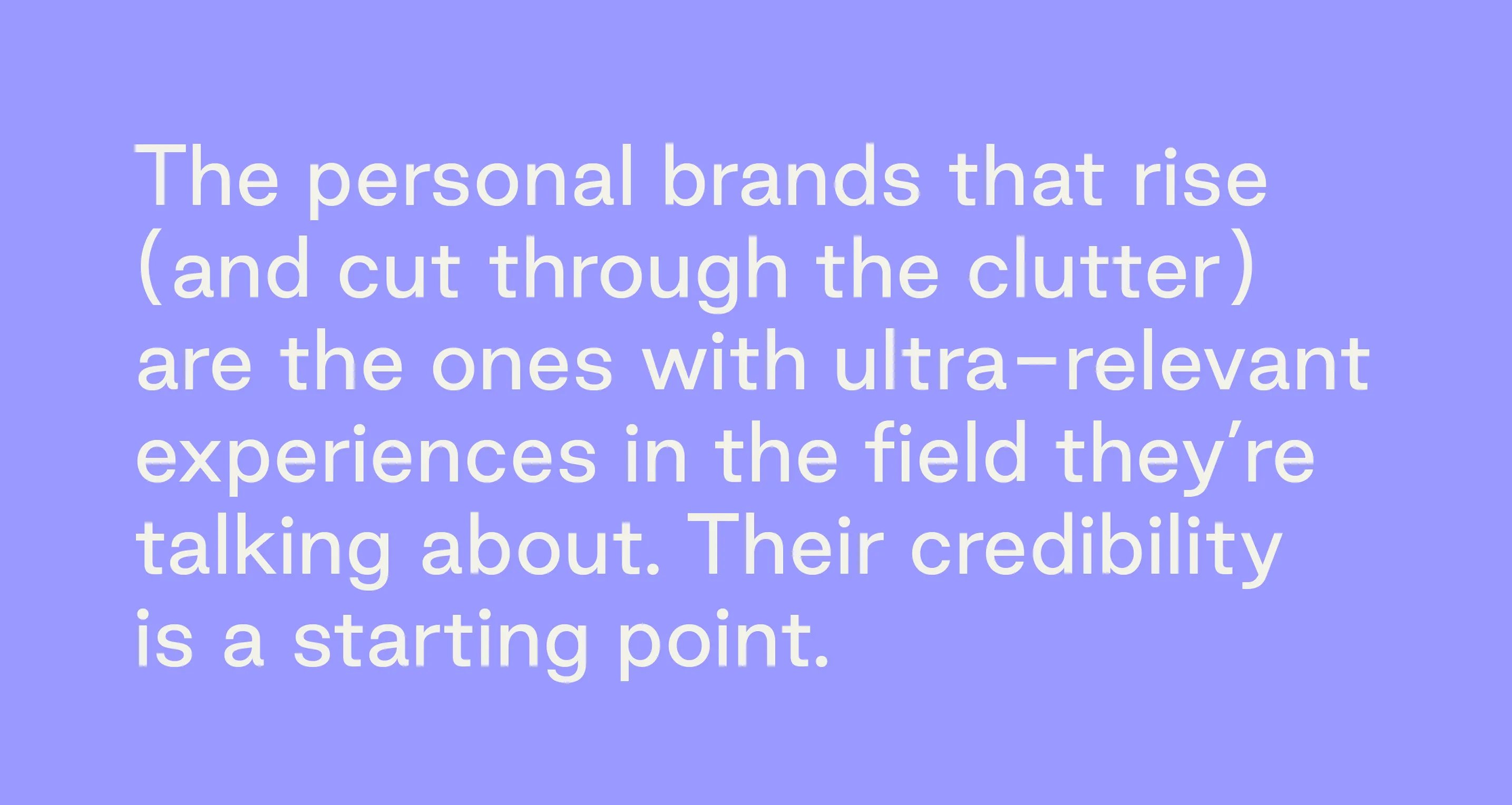CEOs are becoming online creators. Lawyers are launching podcasts. Accountants are blowing up TikTok.
Opening LinkedIn is now no-longer a flurry of job updates. It’s morning routines, humble brags and polished wins—many of them outside of business.
These are all symptoms of a tidal shift in personal branding.
We’re at the peak of personal branding. Everyone’s doing it, everyone's carving out their niche, posting in their lane. Some are even creating online courses, publishing books, starting podcasts.
It’s a saturated market. But is there room for all of us to thrive?
Let’s start with the numbers.
YouTube shared that there were more than 500 videos(1) uploaded to its platform each minute in 2019 which has increased to 1,800(2) videos per minute in 2025. On Instagram, it is estimated more than 95 million(3) photos and videos are uploaded each day and as for the growing popularity of TikTok, approximately 34 million videos(4) are uploaded every day.
So with such a crowded digital ecosystem, how do you cut through? It’s about crafting your niche.
The personal brands that rise (and cut through the clutter) are the ones with ultra-relevant experiences in the field they’re talking about.
Their credibility is a starting point. They clearly know their stuff, they’ve got the track record to back it up. Experience-led personal brands get eyes and, above all, last.
Personal branding V's business branding. What is the right path for you?
Deciding whether to build a personal brand or a business brand can feel like a coin toss – both options are valid and ultimately come down to how you want to shape your reputation.
So start by asking yourself: which one fits with my goals? And when it comes to reputation, should it revolve around you or stand independently?
Here’s the difference between personal branding and business branding.
A personal brand:
- Puts your name front and centre
- Positions yourself as the brand—a walking, talking billboard of credibility
- Is built on your personal values
- Expressed through your voice and your story
- The momentum only lasts as long as you do
A business brand:
- Keeps the focus on your company
- Puts the spotlight on the company purpose, mission, values and goals
- Is helpful for if you’re wanting to sell one day
- Centres the story beyond a founder (though, the founder can and should be part of the story at times).
- Creates something bigger than yourself
People are craving authenticity and realness. Both personal and business branding avenues can offer both, though a founder’s story gives you more flexibility on offering this.
Tools like ChatGPT can be a double-edged sword in the world of personal branding. While they can help amplify your voice, scale a message and polish your thoughts into neat and tidy sentences it also raises questions about what’s real and what’s manufactured.
People may engage with your content, but are they actually engaging with you?
A 2024 study by McKinsey & Company found that over 70% of business leaders incorporate AI into their personal branding efforts. Sure, it increases efficiency, but it also makes for cookie-cutter voices and writing structures, where people risk sounding the same.
The tools designed to enhance personal branding also have the potential to erode trust. So always ask yourself: is what you’re putting out truly reflective of you?
The most enduring personal brands aren’t built on perfection; they’re built on trust.
The Personal Branding Recipe
There are four essential elements for personal branding that all need to work together, according to Personal Branding expert Matt Purcell:
- You need credibility: the proof of what you have done. The challenge here is that you can be respected and still remain unknown.
- You need relevance: who is following you and why? A large following is great, so long as it’s for the right reasons —you can be seen, but not good at something, so you're just noise.
- You need talent: what problems do you actually solve? You can’t fake it till you make it with this one. You need to be known for your expertise, not your follower count. Having lots of followers doesn’t make you credible, having the proof and skill does.
- You need values: what do you stand for and are you easy to work with? People trust someone that knows what they stand for. Your values and message need to be clear, otherwise you may end up being just another option.
The Business and Personal Branding Overlap
Ultimately, personal and business branding should feed off each other. Numerous studies show consumers want to know and connect with the leaders of the brands they like and support.
The same goes for talent wanting to know who they’re working for. Investors too, about the founders who built their potential investment.
No matter which branding path you go down, the use of voice, image and messaging are your ingredients to combine strategically to become recognisable to your target audience. Plus, having clarity on this helps you make the right decisions about your direction and planning for the future.
After all, recognition breeds familiarity. This familiarity breeds trust.
As Zig Ziglar puts it
If people like you, they'll listen to you, but if they trust you, they'll do business with you
When done right, strategic branding will help you to connect with your audience, win more customers and have them choose you over competition.
The most powerful brands in the world have very clear, consistent and recognisable branding – even if they’re a person. And that’s not by coincidence.



